A tribal mediation led to a short truce between the legitimate government and Southern Transitional Council (STC) forces in Yemen’s Abyan province for the Eid al-Fitr holiday.
The three-day truce went into effect on Sunday some two weeks after fighting erupted between the two sides, with neither claiming any progress on the ground.
Abyan tribal sources confirmed to Asharq Al-Awsat that tribal elders in al-Marashqa met with field commanders from both parties to propose a short-term truce in the Sheikh Salem, Tarya and surrounding areas.
Including a complete cessation of hostilities, people were allowed to traveled to and from Abyan’s capital, Zinjibar, which is held by the STC, and Shaqra city, which is held by the government.
Local sources said calm prevailed on the frontlines on Sunday morning and until late at night.
The government did not comment on the truce, but STC spokesman Nizar Haitham said the council is committed to the ceasefire as long as the other side is.
“We are in a state of self-defense. We are committed to any truce and we back the tribal efforts for the humanitarian truce,” he remarked.
The mediators said the truce could be extended if the two parties committed to the ceasefire, which ends of Tuesday.
The truce got underway a day after some of the fiercest fighting in Abyan during which commander of the government’s 153rd Brigade, Mohammed Saleh al-Aquili, was killed.
President Abdrabbuh Mansur Hadi, Vice President Alli Mohsen Saleh and Defense Minister Mohammed al-Maqdishi offered their condolences over his death, saying he fought at the frontline along with the army and resistance on various fronts. He had commanded several operations to liberate territory from the Iran-backed Houthi militias and was among the first to meet the call to save the country from the militants.
The Defense Ministry also announced the death of commander of the 61st Brigade, Hussein al-Usseimi, during battles against the Houthis in the al-Jawf province. It hailed his heroics while he carried out his national duty in defending the revolution and republic.









